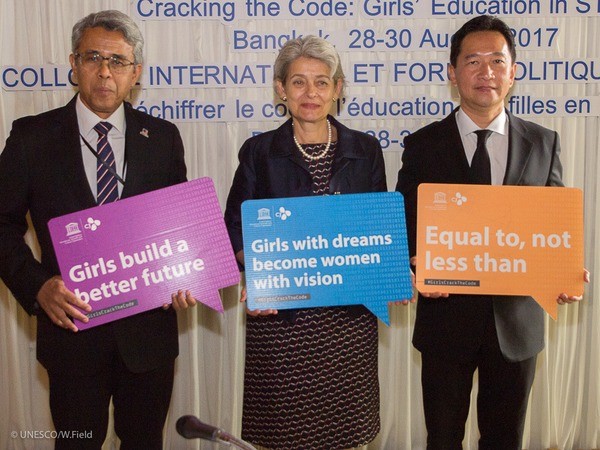UNESCO: ‘Cracking the code’ to end gender disparities in science, technology, engineering and mathematics

BANGKOK (28 August 2017) – Girls and women are significantly underrepresented in science, technology, engineering and mathematics (STEM) professions worldwide, a divide rooted in girls’ earliest days of socialisation and schooling and one that a UNESCO international symposium opening here today aims to address.
Ms Bokova officially launched UNESCO’s groundbreaking new global report, “Cracking the code: Girls’ and women’s education in STEM”, on the barriers stifling girls’ and women’s engagement in and contributions to the STEM fields, as well as practical solutions on how these barriers can be overcome.
The “Cracking the code” publication highlights the systemic impediments girls face at every step of their educational pathways that push them out of these fields. The study shows that by higher education, females represent only 35 percent of all students enrolled in STEM-related fields of study globally. Socialisation and learning processes that perpetuate the false stereotype that “STEM subjects are for boys” carry a pernicious influence.
The report recognises the multifaceted nature of the challenge and proposes a response that is equally comprehensive, including changes to teacher training, learning contents, materials and equipment, assessment methods and tools as well as the overall learning environment and socialisation process in school.
The symposium brings together more than 300 participants, from the highest level of educational policy-making and leading specialists to the field to pioneers in gender-equality in education in multiple cultural contexts and leading female role models who have excelled in their respective fields.
Participants will focus on four themes: gender-responsive quality STEM education; addressing stereotypes and bias hindering girls’ participation; reaching out, engaging and empowering girls and women; and partnerships, cross-sector learning and cooperation.
Indian Girls Code (ICG) initiative, providing free robotics and coding education to underprivileged girls.
Ms Prasad described launching ICG at an orphanage in the small city of Trichi in South India where the typical life cycle of a girl “would be completing free public school, joining a local tailoring shop, getting married and sending their children back to the same orphanage”. ICG sought to break this cycle by empowering girls with new skills. “Our dream is to see these girls… graduate from university and work in jobs that change their perspective, and thereby their entire family’s perspective and prospects,” Ms Prasad said. “That’s where our work starts. With a single girl and the opportunities we can afford her.”
In his opening remarks, Thai Vice-Minister of Education Dr Sophon Napathorn said the full realisation of every citizen’s potential, including girls and women, is essential to national and global development – both his country’s “Thailand 4.0” plan and the 2030 Agenda for Sustainable Development. “STEM education is currently integrated and will be extended to all schools nationwide. Thailand has also created a STEM education network to ensure that STEM is broadly spread across the country,” Dr Sophon said at the opening of the conference. “I firmly believe [the forum’s] success will suggest innovative ways for countries to introduce STEM education.”
Over the next three days, participants will explore the gender inequalities that still persist in STEM education, but also the innovative solutions empowering girls and women worldwide, and how these can be shared and replicated. The goal is for that work to have tangible consequences for girls’ outcomes far after the symposium’s completion.
“I see the face of the 2030 Agenda as a young teenager,” Ms Bokova said when launching the ‘Cracking the code‘ publication, “in school, not forced into marriage or work, empowered to study science, technology, engineering and mathematics – supported by her family and community to become everything she dreams … an engineer, a research, a medical doctor. Without this, no society will prosper.”
During her third visit to Thailand and first since 2012, the Director-General will also be signing the official MOU establishing the International Training Centre in Astronomy, a Category 2 centre under UNESCO, hosted by the National Astronomical Research Institute of Thailand.
Photo: UNESCO Director-General Irina Bokova, centre, with Malaysian Director-General of Education, Tan Sri Dr. Khair Bin Mohamad Yusof, left, and Thai Vice Minister of Education Dr Sophon Napathorn, right. Credit: Warren Field. (UNESCO Text and Photo)
